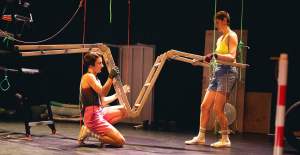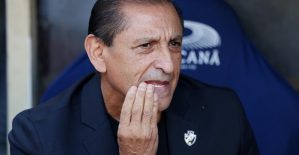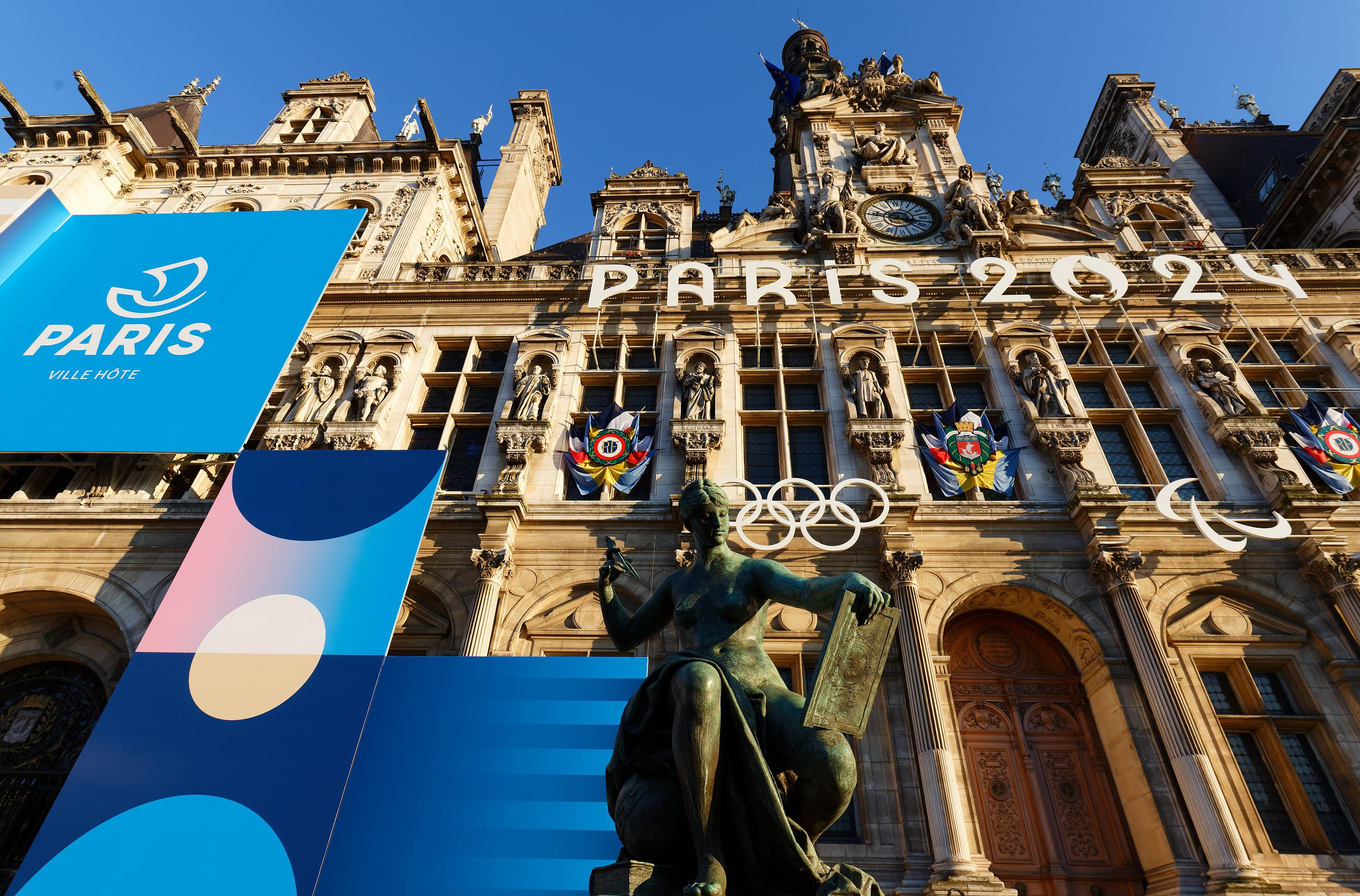We will have to get organized this summer to avoid the few traps set by the organizers of the Paris 2024 Olympic Games. And there are many... Among them, the closure of certain districts of the capital to traffic, the diversion or the shortening of certain bus lines, the closure of several metro stations or even the closure of all Paris airports on the day of the opening ceremony of the event, July 26. So many changes which may seem anecdotal on paper, but which could well become a real headache both for residents of the areas concerned and for all visitors who plan to go to Paris between the months of June and September.
On this subject, the highest authorities have already warned: it will be necessary to organize and anticipate. Because “the big struggle will begin on July 1,” Laurent Nuñez said at the beginning of the month on Franceinfo. The opportunity for the Paris police prefect, who bears the heavy task of managing the movement of crowds and transport during the Olympics, to recall that an important security system will be put in place while we prepare and welcome the event. Knowing that according to him it is necessary to take into account “two scenarios”, which are on the one hand, “security around the Olympic sites” such as “the Trocadéro, the Champ-de-Mars, the Invalides and the Concorde » and on the other, the specificities specific to “the opening ceremony”, which will have an even more important security system.
If a few issues have still not been resolved, and if discussions are still underway to refine these traffic restrictions of all kinds, it is already clear that almost all modes of transport - except walking and bicycle - will be affected by these. Le Figaro takes stock.
This is the dark, and somewhat complex, point of the Olympics: road traffic will be completely redesigned around the Olympic sites. To find your way around, different zones will be set up. As close as possible to the events, red zones - where traffic will be prohibited unless exempted - will be established. These zones will be located around the Eiffel Tower or the Place de la Concorde, in Paris, but also at the Parc des Princes, the Athletes' Village in Saint-Denis, the Accor Arena in Nanterre or the Stade Yves- du-Manoir in Colombes.
In second zones, called blue, traffic will not be prohibited but regulated to avoid “transit traffic”. Only people who live, work or want to go to a business or restaurant in this area will be able to access it by car. These perimeters will only be put in place two and a half hours before the start of the competitions and up to one hour after them. Exceptions are made for areas where ephemeral sites will be installed (such as at Concorde, Les Invalides or Trocadéro for example) for which it will also be necessary to plan for “assembly and dismantling phases”.
The police headquarters adds that for Paris-Centre the traffic restrictions “could be effective from 6:30 a.m. to midnight”. Reserved lanes, such as on the ring road and certain major boulevards, will also be effective “during times to be defined”. Only accredited vehicles will be able to access it. Taxis will be, but not VTCs.
In addition, additional restrictions will apply during exceptional events that will pass through Paris, such as the marathon or road cycling events. “The neutralization time will, however, be very short, and will be done largely during weekends,” promises Laurent Nuñez. Same thing regarding “the special case of the opening ceremony” of the Olympic Games on July 26, with particularly restrictive and drastic security measures which will involve larger restriction zones.
Finally, across the region, other roadways will also be affected by traffic restrictions, with no less than 185 km of lanes reserved for vehicles accredited for the transport of athletes and official delegations.
The list has not yet been finalized, and discussions are “still ongoing” between the Paris police headquarters and Île-de-France Mobilités (IDFM), but several bus lines in the region will be diverted or shortened during the Olympic and Paralympic Games. Some – like line 69 which runs along the Eiffel Tower for example – will “only be diverted by a few streets”, explains IDFM, according to which these minimal changes “are not a catastrophe either”. “The biggest difficulty”, on the other hand, will be to manage line modifications during exceptional events which will pass through Paris, such as the marathon or even road cycling events. “During the event, there will be many lines affected,” continues the public transport organizing authority, which will communicate the exhaustive list of these ahead of the Olympics.
In addition, some metro stations will be closed for the duration of the Olympics, like the three stations closest to Place de la Concorde - namely Tuileries, Concorde and Champs-Elysées-Clémenceau on line 1 - or even of the two T2 tram stations Porte de Versailles and Porte d'Issy, around the Porte de Versailles Arena. Besides these stations, others should be avoided. To find your way around, an interactive map - available on the site anticipaterlesjeux.gouv.fr - lists the stations and lines to avoid, classified according to a color code ranging from green (preferred) to red (avoid).
Among the routes most likely to be congested are line 13, serving major Olympic venues such as the Stade de France, as well as line 10 towards Roland Garros, the Jean Bouin stadium and the Parc des Princes. Big red dot, the Gare du Nord station will be particularly affected “with waiting times to access the platforms of more than 15 minutes”. Other stations - such as Porte-de-Saint-Ouen, Saint-Lazare, Montparnasse-Bienvenüe or even Châtelet-Les Halles will be heavily frequented and therefore labeled “orange”.
Also read: Which metro stations should you avoid during the Olympic Games?
As was announced in mid-February by the prefect of Paris and Île-de-France Marc Guillaume, the Seine will be closed to all navigation in the Paris region "from July 20 to 26" to prepare for the opening ceremony of the Olympic Games . Initially set for ten days, this closure was ultimately reduced to seven during discussions with professionals.
“This tight schedule makes it possible to respond directly to the first concern [of cereal growers], that of being able to transport nonetheless, as often as possible, for as long as possible outside of more restricted periods,” the Minister of Agriculture said at the time. Agriculture Marc Fesneau. While recognizing that “for a month and a half, there would be disruptions” for grain transport, in the middle of the harvest period.
This is the radical decision taken by the organizers of the Olympic Games to ensure everyone's safety during the opening ceremony on July 26: air traffic will be prohibited within a 150 km radius around Paris between 7 p.m. and midnight. “During the opening ceremony of the Olympic Games, a strict temporary prohibition zone, with a radius of 150 km and without altitude limit, will be set up around Paris between 7 p.m. and midnight,” decreed the General Management of Civil Aviation (DGAC) last November, adding that traffic regulations could be “implemented from 5 p.m. on Friday July 26”.
This measure will therefore interrupt the operations of the two largest French airports, Paris-Charles-de-Gaulle and Paris-Orly, but also Beauvais (Oise), specialized in low-cost flights, at the start of a weekend of high summer season. “Apart from emergency services flights and flights which may benefit, exceptionally, from an exemption granted by the Air and Space Force, no flight (neither take-off, nor landing, nor overflight) will not be permitted in this airspace during the mentioned time slot,” insisted the DGAC.
This is the latest imbroglio to date. If the SNCF has just put train tickets on sale for the whole summer, it has however blocked the sale of tickets for departure and arrival, on July 26, from three Parisian stations: Gare de Lyon, Bercy and Austerlitz. In question ? The risk that these will be inaccessible to travelers due to the organization of the opening ceremony of the Olympic Games. Enough to worry many travelers since this date turns out to be one of the biggest crossover weekends of the summer holidays.
Faced with everyone's concern, the Minister Delegate for Transport Patrice Vergriete had to explain himself. “The Paris police headquarters has not yet completely completed its plan to secure the opening ceremony, we will know at the beginning of April,” he declared on TF1, promising in passing that tickets will go on sale half April.

 B:SM will break its investment record this year with 62 million euros
B:SM will break its investment record this year with 62 million euros War in Ukraine: when kyiv attacks Russia with inflatable balloons loaded with explosives
War in Ukraine: when kyiv attacks Russia with inflatable balloons loaded with explosives United States: divided on the question of presidential immunity, the Supreme Court offers respite to Trump
United States: divided on the question of presidential immunity, the Supreme Court offers respite to Trump Maurizio Molinari: “the Scurati affair, a European injury”
Maurizio Molinari: “the Scurati affair, a European injury” Irritable bowel syndrome: the effectiveness of low-carbohydrate diets is confirmed
Irritable bowel syndrome: the effectiveness of low-carbohydrate diets is confirmed Beware of the three main sources of poisoning in children
Beware of the three main sources of poisoning in children First three cases of “native” cholera confirmed in Mayotte
First three cases of “native” cholera confirmed in Mayotte Meningitis: compulsory vaccination for babies will be extended in 2025
Meningitis: compulsory vaccination for babies will be extended in 2025 When traveling abroad, money is a source of stress for seven out of ten French people
When traveling abroad, money is a source of stress for seven out of ten French people Elon Musk arrives in China to negotiate data transfer and deployment of Tesla autopilot
Elon Musk arrives in China to negotiate data transfer and deployment of Tesla autopilot Patrick Pouyanné, CEO of TotalEnergies, is very reserved about the rapid growth of green hydrogen
Patrick Pouyanné, CEO of TotalEnergies, is very reserved about the rapid growth of green hydrogen In the United States, a Boeing 767 loses its emergency slide shortly after takeoff
In the United States, a Boeing 767 loses its emergency slide shortly after takeoff A charred papyrus from Herculaneum reveals its secrets about Plato
A charred papyrus from Herculaneum reveals its secrets about Plato The watch of the richest passenger on the Titanic sold for 1.175 million pounds at auction
The watch of the richest passenger on the Titanic sold for 1.175 million pounds at auction Youn Sun Nah: jazz with nuance and delicacy
Youn Sun Nah: jazz with nuance and delicacy Paris Globe, a new international theater festival
Paris Globe, a new international theater festival Skoda Kodiaq 2024: a 'beast' plug-in hybrid SUV
Skoda Kodiaq 2024: a 'beast' plug-in hybrid SUV Tesla launches a new Model Y with 600 km of autonomy at a "more accessible price"
Tesla launches a new Model Y with 600 km of autonomy at a "more accessible price" The 10 best-selling cars in March 2024 in Spain: sales fall due to Easter
The 10 best-selling cars in March 2024 in Spain: sales fall due to Easter A private jet company buys more than 100 flying cars
A private jet company buys more than 100 flying cars This is how housing prices have changed in Spain in the last decade
This is how housing prices have changed in Spain in the last decade The home mortgage firm drops 10% in January and interest soars to 3.46%
The home mortgage firm drops 10% in January and interest soars to 3.46% The jewel of the Rocío de Nagüeles urbanization: a dream villa in Marbella
The jewel of the Rocío de Nagüeles urbanization: a dream villa in Marbella Rental prices grow by 7.3% in February: where does it go up and where does it go down?
Rental prices grow by 7.3% in February: where does it go up and where does it go down? Even on a mission for NATO, the Charles-de-Gaulle remains under French control, Lecornu responds to Mélenchon
Even on a mission for NATO, the Charles-de-Gaulle remains under French control, Lecornu responds to Mélenchon “Deadly Europe”, “economic decline”, immigration… What to remember from Emmanuel Macron’s speech at the Sorbonne
“Deadly Europe”, “economic decline”, immigration… What to remember from Emmanuel Macron’s speech at the Sorbonne Sale of Biogaran: The Republicans write to Emmanuel Macron
Sale of Biogaran: The Republicans write to Emmanuel Macron Europeans: “All those who claim that we don’t need Europe are liars”, criticizes Bayrou
Europeans: “All those who claim that we don’t need Europe are liars”, criticizes Bayrou These French cities that will boycott the World Cup in Qatar
These French cities that will boycott the World Cup in Qatar MLS: new double for Messi who offers victory to Miami
MLS: new double for Messi who offers victory to Miami PSG-Le Havre: Ramos on his way, Kolo Muani at the bottom of the hole… Favorites and scratches
PSG-Le Havre: Ramos on his way, Kolo Muani at the bottom of the hole… Favorites and scratches Football: Vasco da Gama separates from its Argentinian coach Ramon Diaz
Football: Vasco da Gama separates from its Argentinian coach Ramon Diaz F1: for the French, Ayrton Senna is the 2nd best driver in history ahead of Prost
F1: for the French, Ayrton Senna is the 2nd best driver in history ahead of Prost

















